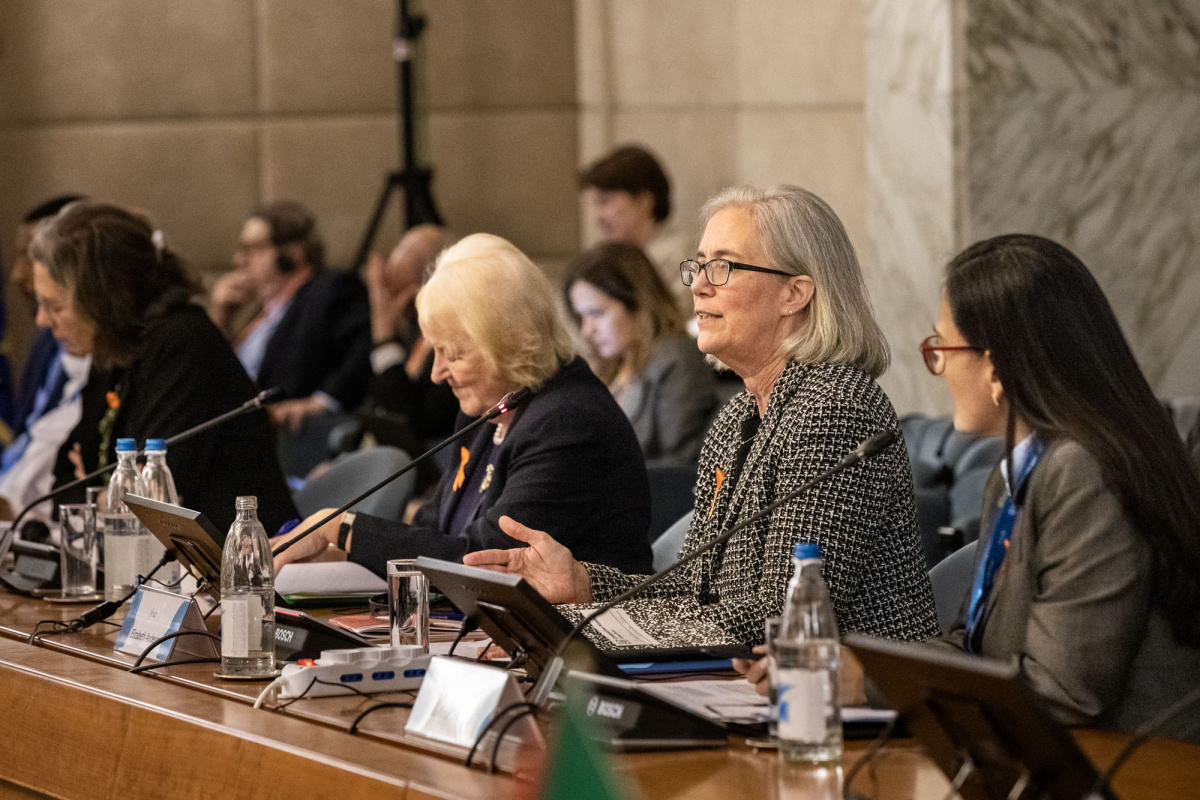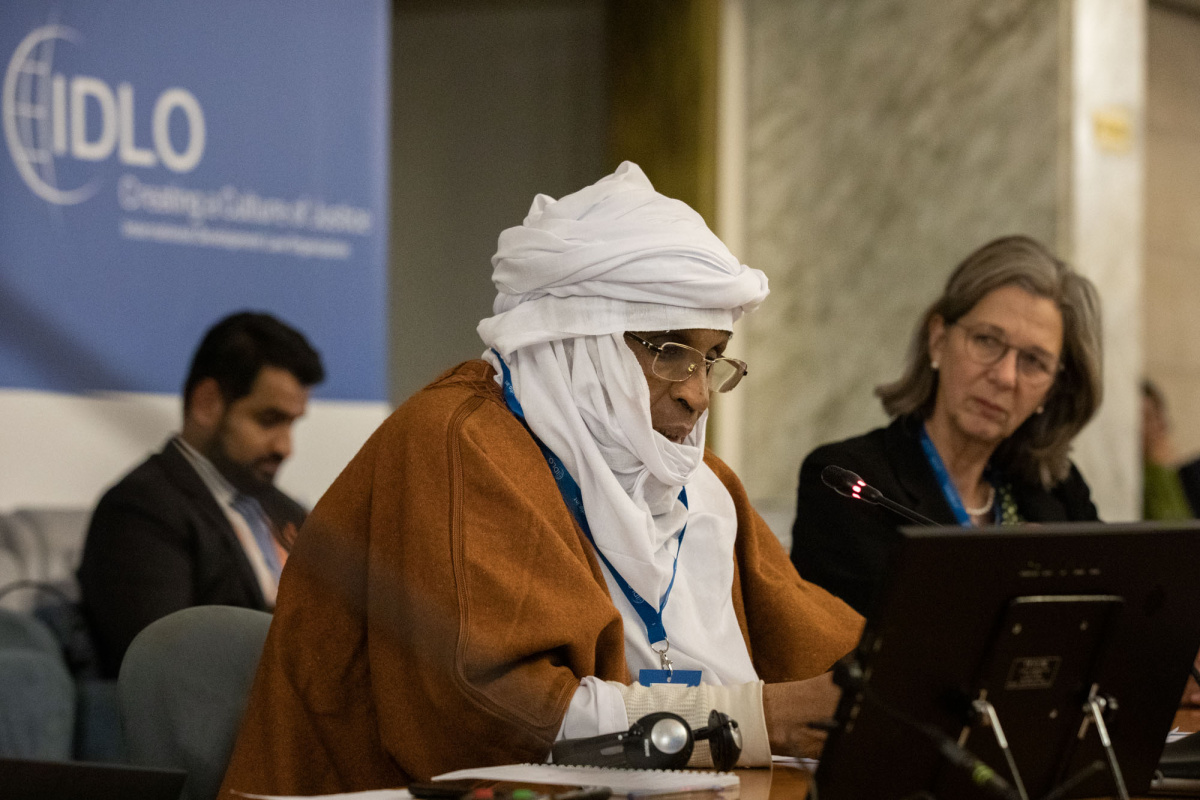 Rome, Italy
Rome, ItalyJustice in crisis
In the face of major intersecting crises, from the lingering COVID-19 pandemic to the rise in violent conflict and the increasingly severe effects of climate change, strengthening access to justice and the rule of law has never been more important.
“Many of the factors undermining trust, from impunity to exclusion, are linked to issues of justice,” said IDLO Director-General, Jan Beagle. “Strengthening justice systems can protect the least powerful, including women and girls, and give them a voice in the debate, helping build confidence.”
Yet, in many contexts around the world, trust in governments and institutions is eroding. At the same time we are seeing increased pushback against multilateralism and sustained attacks on human rights.
“Justice in Crisis” was the theme of IDLO’s 2022 Partnership Forum, an event held annually in Rome on the occasion of the Assembly of Parties (AOP), IDLO’s highest decision-making governance body.
At the forum, UN leaders, justice actors, academics and international development practitioners discussed the challenges faced by justice systems in crisis and conflict situations, and shared approaches for people-centred rule of law.
Affirming that “justice is always part of the solution”, in her keynote address Ambassador Lachezara Stoeva, President of the United Nations Economic and Social Council (ECOSOC) called for solutions to “reverse the troublesome trends in discrimination, exclusion, inequality, violence, hate and intolerance.” She went on to highlight the key role played by justice systems and SDG 16 in catalyzing progress across the 2030 Agenda.
With the unmet demands for justice and the rule of law driving many of today’s global challenges, the forum emphasized the need for innovative solutions and increased cooperation amongst partners. The Netherlands’ Deputy Director-General for International Cooperation, Birgitta Tazelaar, noted that addressing these challenges was the impetus for the establishment of a Justice Action Coalition in 2019.
“It's a platform for both developing countries and…donor countries to exchange data to coordinate initiatives and to learn from each other's practices,” says Tazelaar. “We're really happy that IDLO is also part of this coalition. And we really hope that [it] has the potential to actually transform all the challenges that we are facing.”
Conflict, crises and the rule of law
 The Forum’s panelists also included representatives from the Sahel and Ukraine, where justice systems have been particularly hard hit by intersecting crises.
The Forum’s panelists also included representatives from the Sahel and Ukraine, where justice systems have been particularly hard hit by intersecting crises.
“For me, as the Prosecutor General of Ukraine, justice in crisis has a special meaning and value, ensuring respect and supremacy of the law in the course of an ongoing armed conflict through comprehensive accountability processes in a fair and impartial manner, and upholding the interests of victims and survivors,” said Ukraine’s Prosecutor General, Andriy Kostin, in his opening remarks.
Kostin spoke of the need to continue prosecuting international crimes in Ukraine, including those involving conflict-related sexual violence, corruption and environmental damage, while upholding the integrity and independence of prosecutors.
“On this, we are immensely grateful to IDLO’s continuous support of the reforms in the prosecution service throughout seven years of our partnership aimed at strengthening efficiency of our institution,” said Kostin. “For our part, we will continue to fight in legal battles for justice and accountability for securing the world order, and for a prevailing sense of the rule of law over the rule of force.”
In the Sahel, where the lack of justice and human rights, combined with the mounting effects of climate change-induced droughts have led to instability, Professor Khalid Ikhiri, Former President of Niger’s Commission Nationale des Droits Humains, spoke of the need to end impunity and build confidence in justice systems.
“Judges should be brought closer to reliable justice by recruiting a sufficient number of magistrates, prosecutors, lawyers, and creating new judicial infrastructures in each municipality to strengthen their capacities,” said Ikhiri. “In this sense, the work carried out by IDLO Niger is appreciable. It has allowed in a reasonable time new interventions to reduce in a sensible way the slow judiciary. The intervention of partners is therefore an urgent imperative.”
Ikhiri hinted that without this, as climate change continues to fuel insecurity and migration, there is a risk of people turning to unlawful organizations to fulfill their basic needs.
“Citizens who do not trust justice [systems] will necessarily appeal to private justice. This is what creates insecurity,” said Ikhiri. “To resolve the crisis of confidence in public institutions, the independence of justice should be maintained and protected by all means.”
Research shows that backtracking on justice is not only an issue in contexts of conflict, but a global crisis.
The Director of the World Justice Project (WJP), Elizabeth Andersen, spoke of the findings of the WJP’s recently released Rule of Law Index and how in 2022 the indicators measuring the rule of law fell in 61 per cent of countries. This means that countries’ adherence to universal rule of law principles, such as transparency, equal rights, civic engagement, and the functioning of justice systems is getting worse. This fall includes a decline in constraints on government powers and fundamental rights, such as freedom of association and expression, along with delays and discrimination in the delivery of justice.
Yet, according to Andersen, we can still find a few key bright spots.
“Some of the countries that improved the most in our index this year, are countries that have had peaceful transitions in power over the last year; many of them through elections that were free and fair, suggesting that there is hope when those democratic processes can be allowed to take place,” said Andersen. “So, this is a challenge for IDLO and for this community, to work with partners in those countries that have experienced transition to really ensure that the rule of law and democracy deliver.”
For Lilia Umaña Montiel, Executive Director of Humanamente, the meaningful inclusion of young people is key to ensuring societies address issues such as healthcare, education, employment and social services, which are critical for .current and future generations.
“It is beyond essential that young people participate in designing public policy,” said Umaña. “Because, in the end, it is not only to promote development but to be responsible for sustainability and implementation together.”
According to Umaña, youth engagement must be accompanied by increased cooperation with civil society and the private sector.
Bridging gaps together
 Panelists and participants discussed issues related to gender equality, climate justice and holding governments accountable.
Panelists and participants discussed issues related to gender equality, climate justice and holding governments accountable.
Birgitta Tazelaar of The Netherlands spoke about tools to help close the gender gap for women and girls, such as the implementation of a feminist foreign policy.
“If we do not close that gender justice gap, inequalities will persist and also power imbalances affecting women will also persist,” said Tazelaar. “In our feminist foreign policy, we focus on the four R's, as we say: rights, representation, resources and reality check. Because every situation is different, we always need to do a reality check.”
A further key to addressing justice in crisis according to Elizabeth Andersen, is the availability of quality data.
“Particularly in this area of access to justice, measuring – and how you measure – is really important for understanding the problem and designing solutions that are fit for purpose,” says Andersen. “We at [the World Justice Project] like to say: measure it, change it.”
The discussion also turned to the key role of climate justice, especially in light of the historic agreement at COP27 on the establishment of a loss and damage fund.
Michael Strauss, General Counsel of the European Bank for Reconstruction and Development (EBRD), highlighted the role that the rule of law plays in achieving climate justice.
“We can't forget that the global response to climate change is underpinned by a legal document, the Paris Agreement. Rule of law and climate action are therefore inextricably linked,” said Strauss. “The rule of law in transition towards a sustainable economy also raises key issues of justice, equity and responsibility, which is why we're seeing increased climate litigation globally.”
Strauss noted that a new framework agreement signed by EBRD and IDLO, is a chance to tackle such issues and to provide support for national legal systems through judicial training and information sharing.
By supporting the sharing of ideas and best practices around issues from climate justice to youth empowerment, the 2022 Partnership Forum was a chance to strengthen collaboration, and to uphold the rule of law as a driver of more peaceful, just and sustainable societies for all.
As IDLO DG Jan Beagle reiterated in her closing remarks, “I like very much the idea that rule of law should not be an afterthought; that investment in the rule of law is a smart policy. And I think that we at IDLO would say that is it is the best investment that we can make in our collective future.”

